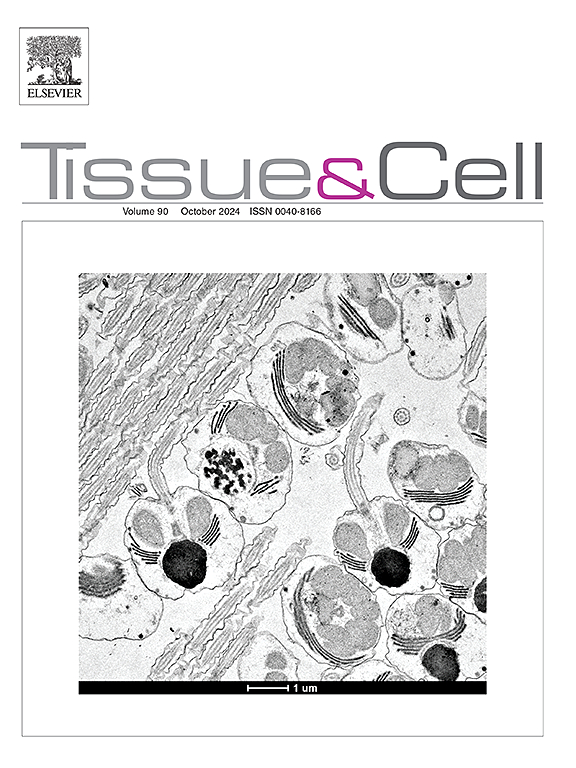Resveratrol enhances sensitivity of renal cell carcinoma to tivozanib: An in-vitro study
IF 2.7
4区 生物学
Q1 ANATOMY & MORPHOLOGY
引用次数: 0
Abstract
Background
Since tivozanib has many side effects in the treatment of kidney cancer, we decided to use resveratrol as a bioactive molecule with anticancer and antioxidant properties to make tivozanib more effective and also reduce its side effects in kidney cancer cell line.
Method
In this in vitro study, we evaluated the effect of tivozanib, resveratrol and tivozanib- resveratrol combination therapy in ACHN cell line as representatives of human kidney cancer. The assessment includes Hoechst dye staining, scratch-wound assay, 3D spheroid, 2D colony formation assay, flow cytometric analysis of apoptosis and DNA cell cycle, real-time PCR (BAX/BCL2, E-cadherin, Snail, HIF1α, VEGFC and KLK3 genes).
Result
To determine IC50 levels, ACHN cells was exposed to different concentration of tivozanib and resveratrol. Our data indicated that IC50 values for tivozanib (0.5 μM) and resveratrol (30 μM) with MTT in a dose and time-dependent manner. Due to the efficacy of resveratrol in combination with tivozanib, we used 20 μM resveratrol, and 0.25 μM tivozanib instead of 30 μM and 0.25 μM respectively. This data was approved by flow cytometry for ACHN cell line with 38.39, 14.74 and 66.06 percent apoptosis and 8.25, 5.12 and 15.6 percent subG1 for tivozanib, resveratrol and tivozanib-resveratrol combination respectively which was as a consequence of cell cycle arrest at G1/S phase. The treatment also reduced cells’ migration, fragmented nuclei, 3D spheroid and colony formation potentials in analyses. Evaluation of gene expression presented that the effect of the tivozanib and resveratrol combination in ACHN cell lines is completely different during the evaluation of apoptosis genes, BAX, P53 genes and E-Cadherin had significantly increased expression compared to single treatment groups (P < 0.01). Meanwhile, a significant decrease was observed in the expression of VEGFC and HIF1α genes in the combination group compared to the monotherapy groups (P < 0.001).
Conclusion
Considering that resveratrol can increase the apoptosis of cancer cells alone and in combination with tivozanib and prevent the proliferation of cancer cells and also reduce the side effects of tivozanib, we suggest that resveratrol as a potential bioactive molecule can be used in treatment of kidney cancer should be used in combination with tivozanib.
白藜芦醇可提高肾细胞癌对替伏扎尼的敏感性:体外研究
方法在这项体外研究中,我们评估了替伏扎尼、白藜芦醇和替伏扎尼-白藜芦醇联合疗法对人类肾癌代表 ACHN 细胞系的影响。评估包括 Hoechst 染料染色、划痕伤口试验、三维球形、二维集落形成试验、细胞凋亡和 DNA 细胞周期流式细胞分析、实时 PCR(BAX/BCL2、E-cadherin、Snail、HIF1α、VEGFC 和 KLK3 基因)。我们的数据表明,tivozanib(0.5 μM)和白藜芦醇(30 μM)与 MTT 的 IC50 值呈剂量和时间依赖性。由于白藜芦醇与替伏扎尼联用的疗效,我们分别使用了 20 μM 白藜芦醇和 0.25 μM 替伏扎尼,而不是 30 μM 和 0.25 μM。流式细胞仪对 ACHN 细胞株的检测结果也证实了这一点,tivozanib、白藜芦醇和 tivozanib-resveratrol 组合的细胞凋亡率分别为 38.39%、14.74% 和 66.06%,亚 G1 细胞凋亡率分别为 8.25%、5.12% 和 15.6%,这是细胞周期停滞在 G1/S 期的结果。在分析中,处理还降低了细胞的迁移、碎核、三维球形和集落形成潜能。基因表达评估显示,在评估凋亡基因时,tivozanib 和白藜芦醇复方制剂对 ACHN 细胞株的影响完全不同,与单一治疗组相比,BAX、P53 基因和 E-Cadherin 的表达显著增加(P < 0.01)。结论考虑到白藜芦醇单独或与替伏扎尼联用均能增加癌细胞凋亡,阻止癌细胞增殖,同时还能减轻替伏扎尼的副作用,我们认为白藜芦醇作为一种潜在的生物活性分子可用于肾癌的治疗,应与替伏扎尼联用。
本文章由计算机程序翻译,如有差异,请以英文原文为准。
求助全文
约1分钟内获得全文
求助全文
来源期刊

Tissue & cell
医学-解剖学与形态学
CiteScore
3.90
自引率
0.00%
发文量
234
期刊介绍:
Tissue and Cell is devoted to original research on the organization of cells, subcellular and extracellular components at all levels, including the grouping and interrelations of cells in tissues and organs. The journal encourages submission of ultrastructural studies that provide novel insights into structure, function and physiology of cells and tissues, in health and disease. Bioengineering and stem cells studies focused on the description of morphological and/or histological data are also welcomed.
Studies investigating the effect of compounds and/or substances on structure of cells and tissues are generally outside the scope of this journal. For consideration, studies should contain a clear rationale on the use of (a) given substance(s), have a compelling morphological and structural focus and present novel incremental findings from previous literature.
 求助内容:
求助内容: 应助结果提醒方式:
应助结果提醒方式:


